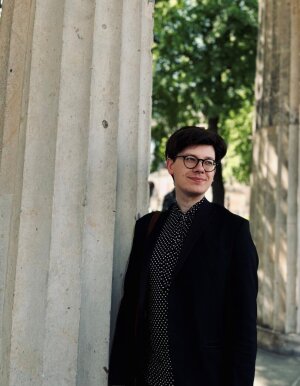Marcel J. Paul
-
Vita
05.04.1998
geboren in Berlin-Biesdorf2016
Abitur in Berlin08/2016-09/2017
Repräsentant der v. Bodelschwinghschen Stiftungen Bethel im Rahmen des Betheljahrs
(FSJ) im » Bethel-Laden « in Lutherstadt Wittenberg10/2017-09/2022
Friedrich Schiller Universität Jena, Gymnasiales Lehramtsstudium für Deutsch und Geschichte10/2019-03/2024
Mitglied des Studierendenrates an der FSU10/2019-10/2022
Studentische Hilfskraft im Institut für Altertumswissenschaften03/2020-12/2023
Mitarbeiter in Schillers Gartenhaus08/2020-07/2022
Stipendiat im Honours-Proramm der FSU Jena für wissenschaftsorientierte Studierende10/2020-09/2023
Friedrich Schiller Universität Jena, Gymnasiales Lehramtsstudium für Latein10/2022-03/2023
Mentor für internationale Studierende an der FSU Jena10/2022-09/2023
Studentisches Mitglied im Gleichstellungsbüro der FSU Jena10/2022-09/2023
Vorsitzender der Fachschaft Altertumswissenschaften der FSU Jena11/2022-12/2023
Wissenschaftliche Hilfskraft am Institut für Altertumswissenschaften05/2023-03/2024
Vorsitzender des Studierendenratesseit 06/2023
Friedrich Schiller Universität Jena, Promotion10/2023-03/2024
Studentischer Senator der FSU02/2024-07/2024
Referendar am Ernst-Abbe-Gymnasium Jenaseit 08/2024
Promotionsstipendium der Hans-Böckler-Stiftungseit 08/2024
Dozent an der Volkshochschule Jena (Abiturkurs Deutsch)seit 10/2024
Mitglied im Doktorandenrat der FSUseit 10/2024
Studentisches Mitglied im Fakultätsrat der Philosophischen Fakultät -
Publications
Belletristische Werke
- Die Banalität der Andersartigkeit, Norderstedt 2015.
- Die Manifestation des Glücks, Norderstedt 2018.
- Glaskasten, Bibliothek deutschsprachiger Gedichte XXII, 2019.
- Bindung, in: Schmidt-Mâcon, Klaus-F. / Gruß, Nikolaus (Hrsg.), Jahrbuch für das Neue Gedicht: Gedicht und Gesellschaft 2021, Frankfurt a. M. 2020.
- Erwache, Bibliothek deutschsprachiger Gedichte XXIII, 2020.
- Flowers and Dandelions, Norderstedt 2020.
-
Presentations
- The Contemporaneity of Ancient and Modern Ideas about Sex and Gender, 07.06.2022, Universität Tiflis, VIII. Students Conference „Contemporaneity of Antiquity“
- Männlichkeit und Krieg in der griechischen Antike, 17.11.2022, Universität Jena, Kolloquium der Hochschulgruppe Bundesverband für Sicherheitspolitik
- Secret Puppet Masters? Eunuchs at the Eastern Roman Imperial Court and Their Role within Palace Communication in the Fifth Century, 06.07.2023, University of Leeds, International Medieval Congress (IMC); Session 1542. Standing between Worlds
-
Images of masculinity in the Peloponnesian War
An analysis of depictions of masculinity in the works of Aristophanes, Euripides and Sophocles
Times of war usually prove to be contexts in which men, and not least the masculinity associated with them, come to the fore. This fact is illustrated not only by current military conflicts, but also by the historical conflicts of ancient Greece. In these conflicts, men always appeared as central players who played a decisive role in determining the course and outcome. Then as now, they were confronted with questions that centred on their male suitability in social coexistence. The dramas published at the time of the Peloponnesian War illustrate how answers to these discourses on images of masculinity were already found in Classical Greece. Attic poets such as Aristophanes, Euripides and Sophocles used the stage as a medium to react to existing social debates with their tragedies and comedies and to publicly address them. Although their works illustrate how ideas of masculinity were critically questioned as early as 5th century Athens, this aspect of research represents a desideratum that requires comprehensive analysis, especially for the already established study of antiquity as well as for the newly developing gender studies.
This dissertation project therefore aims to gain two essential insights: on the one hand, it will examine ideas of masculinity in Athens at the time of the Peloponnesian War and, on the other, it will analyse their depiction in the dramas of Aristophanes, Euripides and Sophocles. Using sociological theories based on the work of Niklas Luhmann, Michel Foucault and Pierre Bourdieu, the dissertation aims to make a new contribution to gender studies in ancient history and to focus specifically on masculinity studies, which have received little attention to date.
-
Honours Programme 2020: The armenian Eunuch Chrysaphius and his contemporary gender-specific reflection and his political Importance in the Byzantine Empire
One of the most important political actors in Constantinople in the 5th century was a clear maverick, both in terms of his gender and his geographical origin: the armenian eunuch Chrysaphius was one of the most important manipulators at the court of Theodosius II (408 - 450 A.D.), but he was socially marginalized due to his belonging to the so-called "third sex", his oriental homeland and his little-regarded position as chief chamberlain (praepositus sacri cubiculi) at court. Contemporary authors create a thoroughly negative image of him that is pervaded by stereotypes. The research project aims to use the case of Chrysaphius as an example to illustrate the specific possibilities that eunuchs at the court had and the means they used to assert their interests. At the same time, it aims to show the limits that restricted their power. In addition, the source images will be subjected to an in-depth gender-historical investigation in order to understand the construction of stereotypes about persons of the "third sex“.
Further information concerning the Honours Programme.
